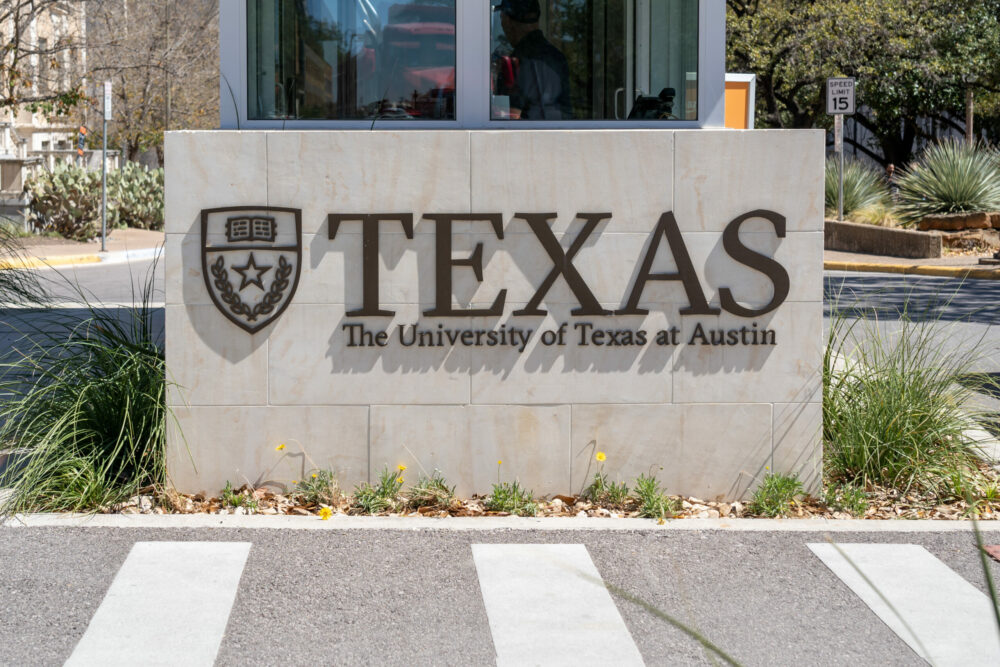AUSTIN, Texas – The University of Texas’ (UT) and Governor Greg Abbott’s response to pro-Palestine protesters on campus is being criticized by free speech experts, faculty, and the media as being disproportionately harsh.
On Wednesday, hundreds of local and state police in riot gear, some on horseback, arrested 57 protesters at a demonstration on UT’s campus after Abbott declared the protest antisemitic. However, 46 of the protesters who were arrested were soon released because the Travis County court found “insufficient probable cause” for criminal trespassing, reports the Austin-American Statesman.
One of those arrested and then released was a FOX 7 Austin photojournalist who was covering the event. The Freedom of Information Foundation of Texas denounced his arrest, calling on law enforcement to protect First Amendment rights.
“That includes peaceful protest and news gathering. The police should not interfere with a working journalist doing his job covering the news in a public place,” reports the Austin American Statesman.
Critics Claim UT Pro-Palestine Protest was Peaceful
On Wednesday evening, immediately after the arrests, a statement from “concerned UT Austin Faculty” condemned the school’s and police response to the protest, which the group claimed had not threatened violence and was intended to be educational.
Jewish students on UT’s campus were divided as to whether or not the protests rose to the level of antisemitism. One student told The Hill the protests were “hateful” because they took place on the second day of Passover. However, others disagreed, saying that no one was being harassed and nothing that was being said was antisemitic.
Free speech experts have also criticized UT’s handling of the matter.
“The image I’ve seen from the University of Texas appears to be a disproportionate response to what the images suggest were a peaceful protest,” Bob Corn-Revere, chief counsel for the Foundation for Individual Rights and Expression (FIRE) told The Hill. “And when you’re using preemptive government force against people who are protesting and not engaging in violence then you err on the wrong side.”
The Associated Press also described law enforcement’s detention of UT protesters as “aggressive,” contrasting it to how police arrested protesters at the University of Southern California (USC), which the AP described as “peaceful.”
In response to the criticism, UT spokesperson Brian Davis shared the following statement on Thursday with the Austin American Statesman: “The University’s decision to not allow yesterday’s event to go as planned was made because we had credible indications that the event’s organizers, whether national or local, were trying to follow the pattern we see elsewhere, using the apparatus of free speech and expression to severely disrupt a campus for a long period.”
Protests, Encampments on College Campuses Spreading Across the U.S.
The pro-Palestine protests at UT are just one of many demonstrations that have taken place on college campuses over the past week. Prompted by demonstrations at Columbia University last week where 108 people were arrested, hundreds more people on college campuses across the nation have been arrested for protesting Israel’s military activities in Gaza.
In Boston, 108 pro-Palestine protesters were arrested at Emerson College on Thursday. On Wednesday, 93 demonstrators were arrested at USC. Pro-Palestine protest encampments have also been erected at Harvard, MIT, Tufts, Cal Poly Humboldt, Yale, NYU, Vanderbilt, Brown University, the University of Michigan, UC Berkeley, Emory University, Indiana University, George Washington University, UCLA, Northeastern, Ohio State, and more.
Most of the universities cracking down claim the encampments on campus that usually accompany the demonstrations disrupt learning, as well as violate university policies, laws, and instructions regarding occupying outdoor spaces.
The pro-Palestine protesters are calling for their schools to divest from organizations they believe are helping Israel conduct the war, including companies that make weapons and Israeli companies.







